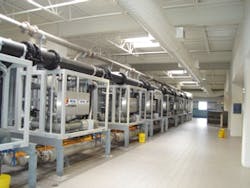Ten Years of Low-Pressure Membrane Plant Operations in Kenosha
More than a decade after going online as the largest low-pressure membrane system in the world, the first in Wisconsin and the first direct membrane filtration process on Lake Michigan, the Kenosha Water Utility’s (KWU) 22-million-gal-per-day (mgd) microfiltration membrane plant can claim satisfaction as an early adopter of new technology. Hundreds of visitors from around the world have toured the facility.
KWU built the membrane plant to update a 40-mgd conventional treatment facility, consisting of the original 20-mgd “west plant,” built in 1895 and upgraded to a conventional filtration plant in 1917, plus a newer 20-mgd “east plant” built in 1964. Following Milwaukee’s 1993 Cryptosporidium outbreak, the utility evaluated several options and decided to completely replace the west plant with a new membrane filtration system and upgrade the east plant.
Solution
KWU settled on a Memcor pressurized membrane system from Evoqua Water Technologies for the new plant. Even though the final installed cost turned out to be $10 million less than projections for replacing the west plant with a comparable conventional filtration process, the utility’s decision to become a membrane pioneer was motivated by a desire to provide the highest quality water possible for its customers. The plant has confirmed its vision every day since its startup in December 1998 by producing high-quality potable water that meets all U.S. Environmental Protection Agency and Wisconsin Department of Natural Resources (DNR) drinking water requirements.
As a direct filtration process of Lake Michigan, Wisconsin DNR requires that the membranes be integrity tested three times a day at eight-hour intervals, which is accomplished with a pressure decay test (PDT) to measure unit integrity. This process is fully automated and conducted with a challenge test pressure of 15 psi on each membrane skid, designed to detect a breach in membrane integrity as small as 3 microns. An air hold test is used when responding to a decline in PDT, during which air bubbles can be heard, pinpointing a specific module leaking air. This allows the plant staff to pinpoint even the smallest breach in integrity, isolate the leak and then fix it as part of scheduled maintenance.
The Kenosha plant also makes sure the membranes undergo regular and effective cleaning to ensure that all the filtration capacity will be available when needed. The original cleaning process used proprietary chemicals supplied by the membrane manufacturer. Process engineers from the manufacturer worked with plant staff to develop an effective cleaning regimen using locally purchased bulk chemicals, saving KWU a considerable amount annually.
Results
Since the plant became operational, KWU's demand for water has evolved while operations and maintenance methods have improved along with membrane quality and replacement options. Several of Kenosha’s largest industrial customers have left the area, reducing water demand. Today, KWU operates the plant at a higher rate through the night, taking advantage of reduced electrical load charges while replenishing storage tanks within the distribution system, and then coasting during the day.
Specific lessons learned at KWU include:
• A utility’s choice of a membrane supplier is not just about cost, but also about selecting a long-term partner;
• Maintaining membrane integrity is the answer to long-term filtered water turbidity, which is independent of raw water turbidity;
• Maintaining membranes in a clean condition is the answer to preserving filtration capacity. As membranes age, long-term fouling effects can reduce capacity if allowed to accumulate on the membrane surface;
• Staff training is more than just attending classes during startup. Sharing experiences with other plants provides a valuable ongoing training benefit; and
• Good financial planning while using all available resources, including the manufacturer’s services, preserves the owner’s plant investment for the long term.
Russ Davis is technical sales manager for Memcor Products at Evoqua Water Technologies, and is based in Geneva, Ill.
